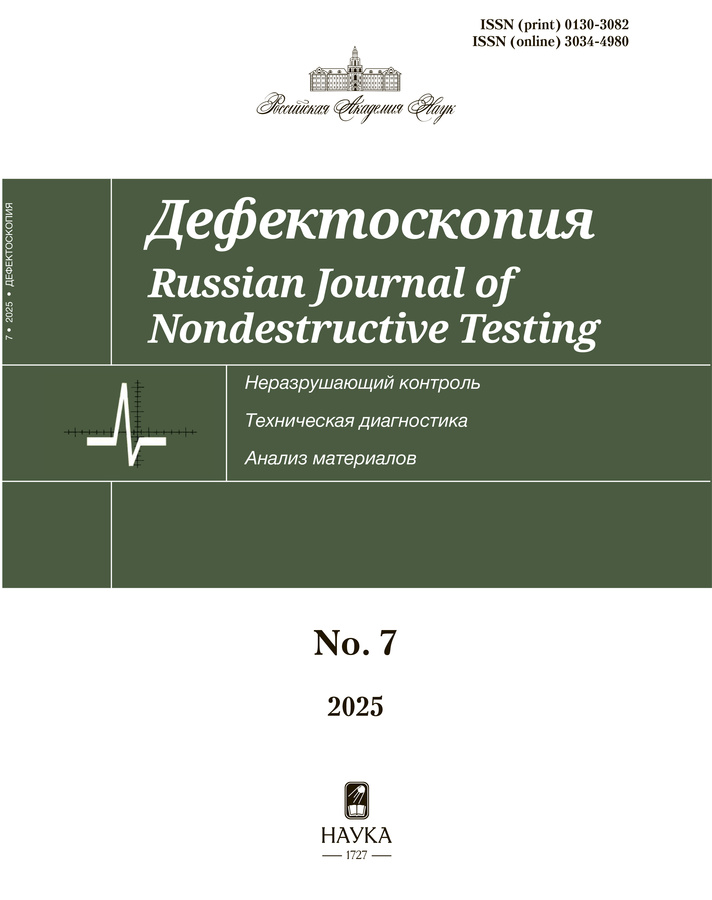ELECTRONIC PARAMAGNETIC RESONANCE AND THERMOLUMINESCENCE OF POLYTETRAFLUOROETHYLENE FOR CONTROL OF RADIATION TECHNOLOGIES
- Autores: Vazirova E.N1, Artemov M.Y.1, Milman I.I.2, Surdo A.I.2, Αbashev R.M.2
-
Afiliações:
- Ural Federal University
- Mikheev Institute of Metal Physics, Ural Branch, Russian Academy of Sciences
- Edição: Nº 7 (2025)
- Páginas: 26-33
- Seção: Radiation methods
- URL: https://bakhtiniada.ru/0130-3082/article/view/288978
- DOI: https://doi.org/10.31857/S0130308225070031
- ID: 288978
Citar
Resumo
The possibility of implementing the high-dose dosimetry method based on a combination of electron paramagnetic resonance (EPR) and thermally stimulated luminescence (TL) phenomena was investigated. Domestically produced polytetrafluoroethylene (PTFE) was used as an ionizing radiation detector. Detector samples were irradiated with accelerated electrons with an energy of 10 MeV with doses from 10 to 50 kGy. After irradiation, the intensities of the EPR and TL signals of each detector were measured. The dependence of the EPR signal intensity on the radiation dose was linear. The TL parameters were equal to: maximum temperature Tm = 164 °C, form factor µg = 0,45, frequency factor S = 4,44·1011 s‒1, activation energy E = 1,14 eV. The spectral composition of TL had a wide band with a luminescence maximum of about 425 nm. The dose dependence of the TL output was also linear in the studied dose range. Annealing of EPR and TL signals occurred in the same temperature range, 160—240 °C. The correlation of dose dependences of normalized intensities of EPR and TL signals, the similarity of their temperature ranges of annealing intensities, indicated that the EPR and TL properties of PTFE detectors are associated with changes in the charge states of the same centers
Sobre autores
Ekaterina Vazirova
Ural Federal University
Email: e.n.agdantseva@urfu.ru
ORCID ID: 0000-0002-6823-9136
Rússia, 620002 Yekaterinburg, Mira str., 19
Mikhail Artemov
Ural Federal University
Email: Mikhail.Artyomov@urfu.ru
Rússia, 620002 Yekaterinburg, Mira str., 19
Igor Milman
Mikheev Institute of Metal Physics, Ural Branch, Russian Academy of Sciences
Email: i.i.milman@urfu.ru
Rússia, 620108 Yekaterinburg, S. Kovalevskaya str., 18
Aleksandr Surdo
Mikheev Institute of Metal Physics, Ural Branch, Russian Academy of Sciences
Email: surdo@imp.uran.ru
Rússia, 620108 Ekaterinburg, S. Kovalevskaya str. 18
Rinat Αbashev
Mikheev Institute of Metal Physics, Ural Branch, Russian Academy of Sciences
Autor responsável pela correspondência
Email: abashevrm@imp.uran.ru
Rússia, 620108 Yekaterinburg, S. Kovalevskaya str., 18
Bibliografia
- Stepanenko V.F., Biryukov V.A., Kaprin A.D., Galkin V.N., Ivanov S.A., Kariakin O.B., Mardinskiy Yu.S., Gulidov I.A., Kolyzhenkov T.V., Ivannikov A.I., Borysheva N.B., Skvortsov V.G., Akhmedova U.A., Bogacheva V.V., Petukhov A.D., Yaskova E.K., Khailov A.M., Lepilina O.G., Sanin D.B., Korotkov V.A., Obukhov A.A., Anokhin Yu.N. Intracavitary offline “in vivo” dosimetry for high dose-rate prostate brachytherapy with Ir-192: development of technology and first results of its application // Radiation and Risk. 2017. V. 26. No. 2. P. 72—82. https://doi.org/10.21870/0131-3878-2017-26-2-72-82
- Kortov V.S., Milman I.I., Monakhov A.V., Slesarev A.I. Combined TSL-ESR MgO detectors for ionizing and UV radiations // Radiation Protection Dosimetry. 1993. V. 47. Is. 1-4. P. 273—276. https://doi.org/10.1093/oxfordjournals.rpd.a081749
- Kortov V.S., Milman I.I., Slesarev A.I., Kijko V.S. New BeO Ceramics for TL ESR Dosimetry // Radiation Protection Dosimetry. 1993. V. 47. Is. 1-4. P. 267—270. https://doi.org/10.1093/oxfordjournals.rpd.a081747
- Yukihara E.G., Bos A.J.J., Bilski P., McKeever S.W.S. The quest for new thermoluminescence and optically stimulated luminescence materials: Needs, strategies and pitfalls // Radiation Measurements. 2022. V. 158. No. 106846. P. 1—19. https://doi.org/10.1016/j.radmeas.2022.106846
- D’Amorim R.A.P.O., Teixeira M.I., Caldas L.V.E., Souza S.O. Physical, morphological and dosimetric characterization of the Teflon agglutinator to thermoluminescent dosimetry // Journal of Luminescence. 2013. V. 136. P. 186—190. https://doi.org/10.1016/j.jlumin.2012.11.045
- Milman I.I., Surdo A.I., Abashev R.M., Tsmokalyuk A.N., Berdenev N.E., Agdantseva E.N., Popova M.A. Polytetrafluorethylene in High-Dose EPR Dosimetry for Monitoring Radiation Technologies // Russian Journal of Nondestructive Testing. 2019. V. 55. P. 868—874. https://doi.org/10.1134/S106183091911007X
- Rokeakh A.I., Artyomov M.Yu. Continuous wave desktop coherent superheterodyne X-band EPR spectrometer // Journal of Magnetic Resonance. 2022. V. 338. No. 107206. P. 1—18. https://doi.org/10.1016/j.jmr.2022.107206
- Pagonis V., Kitis G., Furetta C. Numerical and practical exercises in thermoluminescence. New York: Springer, 2006. https://doi.org/10.1007/0-387-30090-2
- Karakirova Y. Application of Amino Acids for High-Dosage Measurements with Electron Paramagnetic Resonance Spectroscopy // Molecules. 2023. V. 28. Is. 4. No. 1745. P. 1—13. https://doi.org/10.3390/molecules28041745
- Chen R., McKeever S.W.S. Theory of Thermoluminescence and Related Phenomena. Singapore: World Scientific, 1997. https://doi.org/10.1142/2781
- Yukihara E.G., McKeever S.W.S., Andersen C.E., Bos A.J.J., Bailiff I.K., Yoshimura E.M., Sawakuchi G.O., Bossin L., Christensen J.B. Luminescence dosimetry // Nature Reviews Methods Primers. 2022. V. 2. No. 26. P. 1—21. https://doi.org/10.1038/s43586-022-00102-0
- Demol G., Paulmier T., Payan, D. Characterization of Charge Traps Properties in Space Used Fluoropolymers Through Thermo-Stimulated Electrical Methods // IEEE Transaction on Plasma Science. 2023. V. 51. Is. 9. P. 2530—2537. https://doi.org/10.1109/TPS.2023.3255300
- Vazirova E.N., Milman I.I., Surdo A.I., Abashev R.M. RF Patent No. 2816340. 2024.
Arquivos suplementares









